ABSTRACT
BACKGROUND
The research is conducted to determine the level of medical student’s perception regarding medical ethics subject and what strategy should be used to convey the ethical knowledge in their practice. The effort is required for implementation of this course as a compulsory subject as students have shown great affinity towards this subject
OBJECTIVE
To identify the perception of medical students regarding teaching of medical ethics in their curriculum.
STUDY DESIGN & SAMPLING TECHNIQUE
It is a cross sectional study. Students were selected through Simple Random Sampling.
STUDY SETTINGS & PARTICIPANTS
Data gathered through structured questionnaire distributed among private and Government medical universities. Collected data is analyzed on SPSS version 17. Percentages and frequencies are computed and chi-square test of significance is used to obtain the result.
RESULTS
Our study revealed that among 112 respondents 108 (96.4%) respondents considered education in medical ethics is important while 4 (3.6%) respondents said that education in medical ethics subject is not important.
CONCLUSION
It is concluded the medical students are really eager to learn more about medical ethics, they rated the overall course of subject medical ethics as good and helpful for their professional growth. The effort is required for implementation of this course as a compulsory subject as students have shown great affinity towards this subject.
KEYWORDS
Ethics, Curriculum, Perception, Professional Growth, Health, Education
Dr. Muhammad Athar Khan
Associate Professor
Department of Community Health
Sciences
Karachi Medical & Dental College
Beenish Zafar
Senior Lecturer
Ziauddin College of physical Therapy
Ziauddin University
[Khan MA, Zafar B. Perception of Medical Students regarding Medical Ethics Teaching in their Curriculum. Pak. j. rehabil. 2017;6 (1):51 -57]
INTRODUCTION
‘Ethics’ can be defined as the branch of study that possesses standards of conduct including philosophy, psychology, law, or sociology1. Professional moral conduct also comes under the umbrella of ethics, whereas in health sector, it is defined as health or medical ethics. Health ethics is one of the core subjects which medical students of all over the world think they should be taught for their better excel in their professional career2. Students are the backbone to practice and implement ethics with their medical practices3. The intention of this study is to find out problems faced by students during their visits to wards, examining patients, treating them. This study intends to find out the perception of medical students towards health ethics and their willingness to study and practice it in the community perspectives. It combines methodological approach to determine whether students know anything about this subject and their keenness to make this subject as a component of their curricular4.
Ethics refers to the study and expansion of one’s ethical standards. Health and medicinal practitioners deal with ethical dilemmas on a regular basis. In fact, ethical dilemmas are not extraordinary or atypical incidents and thus need special consideration. Institutional practices to ethics are required to be executed, as a replacement for individual behavioral approaches that depends on someone’s beliefs or instincts5.
Medical ethics envelops its practical relevance in clinical settings in addition to history taking, making of diagnosis and treatment of patient.
Medical ethics has its function in the assessment of human subjects, the founding of hospital, making ethics committees, the extension of the role of clinician ethicists, and the assimilation of ethics into many medical school curricula.Medical Ethics envelops its practical relevance in clinical settings in addition to history taking, making of diagnosis and treatment of patient. It has its function in the assessment of human subjects, the founding of hospital, making ethics committees, the extension of the role of clinician ethicists, and the assimilation of ethics into many medical school curricula.
Pakistan Medical and Dental council has also provided the codes of ethics to be practiced by all the practitioners of medical and dental health personals that laid exclusive emphasis on consents, relationship with patient and their family members, fee structure, While conducting medical research in which the human subjects are involved, investigators must remember all the responsibilities and obligations in regard to each and every individual patient. The Ethical code of conduct of research requires that the participation of every individual must be according to his/her own will, and must be provided with complete information of the research and given consent regarding the impending advantage and detriment of participation; and to ensure the protection of vulnerable individuals. The rationality of findings must report questions of sufficient significance to justify any risks to the contributors of research. In any clinical trial there must be genuine ambiguity as to which treatment arm offers the most benefit, researchers must refer to the existing literature and pursue the advice of experts in research ethics6.
Health ethics is one of the subjects which have its discussion in the code of conducts by Pakistan Medical and Dental Council and Pakistan Medical Association but one which medical students of all over the world think they should be taught for their better excel in their professional career7. The Pakistan Medical and Dental Council has not yet started this subject as the separate subject in the educational curricula while many private institutions in Pakistan like Institute of Business Management has included it as an optional course for the medical graduates in their post graduate program of health management. Students are the backbone to practice and implement ethics with their medical practice. this study combines methodological approach to determine whether students know anything about this subject and their keenness to make this subject as a component of their curricular.
According to a study with the title of, “Medical students’ perceptions of their ethics teaching” conducted at King’s College London, School of Medicine provided a very helpful insight about the students’ perception of ethics education as what they think about the significance of learning ethics and law, moreover how engaged they sense with the subject8. They think that ethics teaching is now entrenched in the UK medical schools’ curricula, and concern of the deliverance and assessment of medical ethics is necessary. Current evaluation of assessment and teaching of ethics in the 28 UK medical schools, and the discussion at the Conference on Learning, Teaching and Assessing Medical Ethics called attention to the need for an obvious focus on future perceptions by the medical students themselves and so deliverance of medical ethics knowledge as a subject is important.
Another study performed at the Newcastle University, UK with the title “Assessing the clinical ethical competence of undergraduate medical students”. A course ethics and laws about health is a component of curriculum and every year students from different batches are assessed on the basis of this subject’s knowledge. Yet, the stern query for evaluation continues: ‘Do training and coaching on ethical grounds have any quantifiable effect on the clinical performance of medical students?’ Those who were accountable for teaching i.e.; the teaching faculty handle such issues, each year they meet to formulate gauging parameters. Should the understanding of the students be assessed? Or should the student’s moral reasoning be assessed, to be precise, what choices are being finished by the student, and, the procedures of backing their rational, or shall the evaluation of students be mandatory at some stage in their interaction with patients in clinical setting. Since the year 1982 till 1991, at Newcastle the assessment was by and large meant to shape the quality of the students’ knowledge comprises of ethics. This paper depicts the strengths and limits of a solely knowledge-based process of evaluation label ‘clinical ethical competence’ in conditions of how in reality this knowledge base is being applied in restricted domains of treatment9.
Another study with the name of “Knowledge, Opinions, Attitudes, and Practice of Medical Ethics among Medical Students” this study supplemented a sound ethical knowledge among medical students that were the part of Institute of Medicine of University Brunei Darussalam. The research was conducted with a basic intend to ascertain the wide-ranging intensity of understanding and knowledge of students of medical in provision of a standard point which will be one of the gauging tool for student’s progress as they progress all the way through their academia. In the end it is concluded that approximately 55% of the undergraduates had that knowledge of ethics that was expected of them at this level of academics. Students prefer to brazen out ethical dilemmas, instead of finding a clarification. They like to steer clear of them, address them occasionally, or pass on them to somebody else usually. The proportions of the student who prefer to respond actively were 64.8% for universal situations and 85.9% for Islamic scenarios. Ethical judgments were in sky-scraping accord with ethics according to the principles of Islam10,11.
Another study with the title “Teaching of medical ethics: students’ perception in different periods of the course”, was conducted at Brazil. That study was to find out if Medical ethics is prearranged to channel medical practitioners en route for healthier professional practice. As mentioned by the participants, part of ethics teaching fluctuates, when it is of use to accustom their self with their practice and endow with self-reliance, to scarce or absent because of an overall superficial approach. So lastly it is being concluded that most important deficiencies concomitant with the knowledge and training of medical ethics are pointed to the necessity to transform existing medical education model. On the other hand, its teaching in medical schools looks as if it is being neglected. It was in fact a great attempt that places a great emphasis on routine training; the participants experienced discomfiture in front of patients. When bringing into consideration the liaison with the expert or professor, the recognized negligence and disagreement of interests in the practices of their. It was observed that the presence of Immoral infrastructure and absence of professional relationship in public sector or in government organizations, when matched with the private ones. Few conflicts those were faced by the students in their personal practice were powerlessness in coping with patients’ problems, insecurity and insufficient awareness of medical privacy limits.
Another study was conducted in Turkey, with the title Interns’ Perceptions on Medical Ethics Education and Ethical Issues. In this study they acquired information with reference to the student’s perceptions about the education of ethics that they get and the ethical problems they come across. While assessing their ethical didactic requirements, in the imminent years they have designed to cover undergraduates who can put in writing reports on any movie or reviews on manuscripts and explicit ethical concerns, lay emphasis on the significant ethical principles when they accomplish quantifiable tasks as novices, and compose an assortment of actions using indistinguishable interrogations of patients. It is their objective to build up and endure new-fangled solicitations to be implemented in the education of medical ethics. seeing that in specific domain of medical ethics practitioners experience innumerable issues, the related discussions and findings of the study possibly will highpoint concerns and may give points of solutions to other medical schools as well as they formulate the new curriculum for ethics and appraise their existing curriculum10.
One study conducted at University of Nijmegen, Netherlands, according to that application and practice of ethics is purely a personal matter of medical students. The authors contemplated that individual’s personal feeling have greater impact on execution and practices of moral education. In this part, they shed light on the effectiveness of personal feelings that they can be a rock-hard foundation for moral education by concentrating on the analysis of compassion by the French phenomenologist Emmanuel Housset. It primes all the concerns in regard to elucidation of touch and dialectal; these concerns were able to have a habitation in medical education by means of an ethical assortment that will end up helping students in their moral development. It will improve their countenance of moral aspect of medical practice as well as the effects of self-knowledge and dialectal mastery that will limit the downside of ethical subjectivism and will stimulate the inclination to encounter the other. Eventually it will show medical students from the scratch that their moral responsibility is many times greater to just follow the rules and that they are involved personally11.
Clinical decision-making and reasoning in the domains of ethics are regarded as ‘professional skills’12, and by virtue of this they are equally credible and responsible for effectual clinical practice likewise clinical sciences and biomedical in identifying patient’s issues. Regardless of all this all undergraduate programs that include medical ethics have a propensity to spotlight the concepts of bioethics inclusive of all the ethical disputes that are prominent for example IVF In Vitro Fertilization and euthanasia, instead of using these types of ethical knowledge (philosophies, rules, doctrines, concepts) to medical training. Un-astonishingly, innumerable medical students and clinicians experience substantial trouble in application of their ethical knowledge that will provide assistance in manufacturing proficient judgements in ethical domains in their routine clinical training. This tabloid defines the expansion of structured contents to guide and train medical graduates in attaining a broad methodical tactic towards ethical reasoning clinical inquiry and decision-making13,14.
According to one of the study conducted at Australia other than the disagreements concerning the solicitation and gauge of medicine in ethics, this scrutiny need to be reckoned and should be considered by innumerable as crucial apparatus or expertise mandatory for professionalism, communal to all exercises on clinical grounds. Moreover, it can be argued that inquiry and rational are skills and carry weightage as heart of high-quality patient care an effectual communal skills or the appliance of knowledge in quantifiable disciplines. Tutoring in ethics characteristically lay emphasis on familiarity of ethical model, ideologies, perceptions and disputes, likewise euthanasia, informed consent and quality of Life. Remarkably health apprentices put in great effort to remain relevant in applying the knowledge of ethics in clinical practices15.
According to one of the study conducted at Brunaii with the name, Knowledge, opinions, attitudes and practice of medical ethics among medical students, it reports results of a cross sectional study by assessing self-administered questionnaire on ethical information among medical students at the Institute of Medicine of University Brunei Darussalam. The research was primarily conducted with the intention to ascertain the wide-ranging echelon of awareness and understanding among medical students in provision of baseline that could be used in assessment of students’ progress as they move about all the way from beginning to end in medical course. The outcomes of data analysis would be utilized in the refinement of design of the ethico-legal fragment of the undergraduate medical prospectus. The finale from the analysis is the proportion of students with anticipated understanding of ethics was about 55%. Students antagonize ethical dilemmas instead of finding a solution for them16.
METHODOLOGY
Study Design
It is a cross sectional study.
Sample Size
112 students were randomly selected from different medical universities.
Sampling Technique
Simple Random Sampling.
Study Settings & Participants
Students from private and Government medical universities.
Inclusion Criteria
The inclusion criteria included 3rd, 4th and final year students of both public and private medical universities of Karachi.
Exclusion Criteria
The exclusion criteria include all the students of 1st and 2nd year, house officers, residents and postgraduates
and all non-medical personals.
Data Collection Procedure
Data gathered through structured questionnaire distributed among
Data Analysis Procedure
Collected data is analyzed on SPSS version 17. Percentages and frequencies are computed and chi-square test of significance is used to obtain the result
Study Duration
6 months
Ethical Considerations
An approval was taken from the all participants by signing the consent form after explaining the purpose of the study. Name of Participants and institution will be kept confidential.
RESULTS
Our study revealed that among 112 respondents 50 (44.6%) were 22 years of age. Mean ± SD was 22 ± 0.99 years.
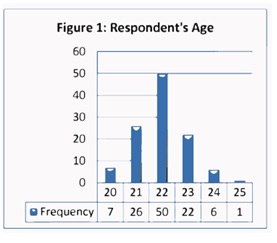
Out of 54 (48.2%) males and 58 (51.8%) females, 56 (50%) were the students of third year. 65 (58%) students were from private institutes and 47(42%) students were from public institutes (Figure2).
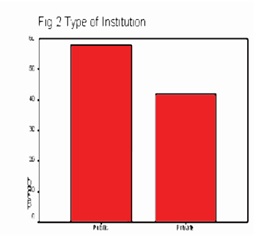
78(69.6 %) respondents were interested in studying medical ethics subject (Table 1).
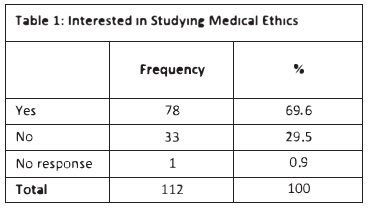
50 (45%) respondents rated medical ethics subject as good if they will be taught (table 2).
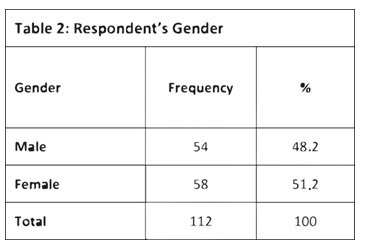
108 (96.4%) respondents considered education in medical ethics was important (Figure 3) out of which 63(56%) respondents were from public sector universities while 45 (44%) respondents were from private sector universities.
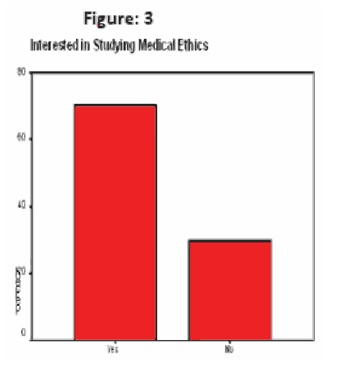
An ethical background has been acknowledged as an important aspect for medical professionals. From the time when current advancements in medical care are linked with complex ethical issues, it is of utmost importance that medical students should learn and understand ethics within a skeleton that is well-substantiated and rigorous. Including medical ethics in the curriculum for medical students is regarded as an imperative educational input to the humanitarian aspect of medicine. The primitive stage of the subject at which it is introduced to the students is of utmost importance. Medical ethics is a subject which compels each individual to make up his or her own mind on their attitudes to the various problems that will be encountered. All those attitudes will be affected to a greater extent by the guidance of their colleagues and teachers for that reason it is advisable that each student becomes attentive of the potential moral dilemmas at an early stage and he can be able to develop the thinking process throughout undergraduate training and succeeding professional life.
The research found that medical students are really eager to learn more about medical ethics, respondents rated the overall course of subject medical ethics as good and helpful for their professional growth, although this subject is being taught during the clinical visits of students unofficially but it need to be implemented as a compulsory subject by PMDC as still there is a need to improve the overall health ethics subject at every level i.e.; public and private. So the effort is required for implementation of this course as a compulsory subject as not only the students have shown great affinity towards this subject but due to the importance of this subject as well.
DISCUSSION
Verdicts confirmed the downfall in the practices of ethics among medical students during the progression of academics and practices in students and residents. The information that indicated decline in ethical practices was also evident in further disquisitions17-19.
There was a testified momentous rise in cynicism amongst medical students20-22 and those findings were independent of gender and curriculum type.
Evaluations of students of dental medicine daub a comparable depiction23. In cross-sectional comparison done by Sherman and Cramer’s24 in U.S. on 130 dental students, self-assessed compassion waned ominously during clinical phase of training. The capability to mark judgements and decrees that are moral (that is, ethical) and to act in harmony through such decrees is crucial. It was investigated by Schillinger on 1,149 students that were enrolled in innumerable subjects, amongst the 531, 304 were enrolled in medicine while the rest of them were in psychology. The moral judgment ability of those enrolled in psychology had upgraded noticeably all through their academia while it was worsened among medical students25. Students comebacks to interrogations about training atmosphere delivered significant enlightenments to these fore mentioned findings. Moral judgment capability was in a reduced amount amongst students studying theory; those who were by now rationally involved in their turf even though in university the moral judgment competency got trained 26,27.
The educational amenities and infra-structure need to be apposite to convey the curriculum 28.
Consequently it is obligated to every medical education organization to provide with ample means in attainment of practices in medical ethics and professionalism and so at least one full-time-equivalent senior faculty of ethics with relevant expertise29. The sights of medical professionals and medical students were thoroughly assessed and listened and it is ruled out that the training and wisdom of medical ethics and law be assimilated steeply and parallel in undergraduate curriculum as a whole, on the other hand it furthermore necessities to be explicitly unified with other corresponding subjects30,31. The World Health Organization’s commendations regarding patient protection is at present steered in 10 medical schools globally.
A communal compulsion of every teacher is to follow and enforce the practices of medical ethics. Every institution should ensure that students will receive instructions in proper medical ethics before participating in patient care activities. The institutes’ educational objectives may categorize supplementary dimensions of ethical behavior to be demonstrated in patient care settings.
So it is recommended that teaching of medical ethics should be prescribed in the curriculum of medical students.
CONCLUSION
It is concluded that medical students are really eager to learn more about medical ethics, they rated the overall course of subject medical ethics as good and helpful for their professional growth, there is a need to improve the overall health ethics subject at every level i.e.; public and Private both, as Medical ethics is concerned with promoting health and medicine and clarifying norms for improving relationships between patients and physicians. So the effort is required for implementation of this course as a compulsory subject as students have shown great affinity towards this subject.
REFERENCES
[1] Resnik DB. What is ethics in research & why is it important. Research gate. 2008;8(8):1-5
[2] Kasule H. Knowledge, opinions, attitudes and practice of medical ethics among medical students. Rev Med Chil. 2011;139(1):36-44
[3] Davey P, Lees AB, Godbold R. Exploring New Zealand paramedic attitudes towards advance directives: An ethical analysis. AJP. 2016;13(4):1-10
[4] Madigosky WS. Changing and sustaining medical student’s knowledge, skills and attitudes about patient safety and medical fallibility. Academic Med J. 2006;81(1):94-101
[5] Preston-Shoot M, McKimm J, Kong WM, Smith S. Readiness for legally literate medical practice? Student perceptions of their undergraduate medico-legal education. J Med ethics. 2011;37(10):616-622
[6] McPhail K. The other objective of ethics education: Re-humanising the accounting profession– a study of ethics education in law, engineering, medicine and accountancy. J Bus Ethics. 2001;34(3-4):279-298
[7] Pakistan medical and dental council. 2006. Rules and Regulations. PMDC. Pakistan
[8] Bias PP. Clinical Reasoning: The Analysis of Medical Decision Making. Ulster Med J. 2016;85(3):151-152
[9] Hurst SA, Hull SC, DuVal G, Danis M. How physicians face ethical difficulties: a qualitative analysis. J Med ethics. 20051;31(1):7-14
[10] Myser C, Kerridge IH, Mitchell KR. Teaching clinical ethics as a professional skill: bridging the gap between knowledge about ethics and its use in clinical practice. J Med Ethics. 1995;21(9):97-103
[11] Johnston C, Haughton P. Medical student’s perception of their ethics teaching. J med Ethics. 2007;33(7):418-422
[12] Mitchell KR, Myser C, Kerridge IH. Assessing the clinical ethical competence of undergraduate medical students. J Med Ethics. 1993;19(4):230-236
[13] Al-Haqwi AI, Al-shehri AM. Medical student’s evaluation of their exposure to the teaching of ethics. J Family Community Med. 2010;17(1): 41-45
[14] Edward C, Preece PE. Shared teaching in health care ethics: a report on the beginning of an idea. Nursing ethics. 1999;6(4):299-307
[15] Hanson S. Teaching health care ethics: why we should teach nursing and medical students together. Nursing ethics. 2005;12(2):167-76
[16] Rogers W, Ballantyne A. Towards a practical definition of professional behavior. J Med Ethics. 2010;36(4):250-4
[17] Hojat M, Vergare MJ, Maxwell K, ainard G, Herrine SK, Isenberg GA et al. The devil is in the third year: A longitudinal study of erosion of empathy in medical school. Acad Med. 2009;84(9):1182-1191
[18] Hojat M, Mangione S, Nasca TJ, Rattner S, Erdmann JB, Gonnella JS et al. An empirical study of decline in empathy in medical school. Med Educ. 2004;38(9):934-941
[19] Newton BW, Barber L, Clardy J, Cleveland E, O’Sullivan P. Is there hardening of the heart during medical school? Acad Med. 2008;83(3):244-249
[20] Thomas MR, Dyrbye LN, Huntington JL, Lawson KL, Novotny PJ, Sloan JA et al. How do distress and well-being relate to medical student empathy? A multicenter study. J Gen Intern Med. 2007;22(2):177-183
[21] DiLalla LF, Hull SK, Dorsey JK. Effect of gender, age, and relevant course work on attitudes toward empathy, patient spirituality, and physician wellness. Teach Learn Med. 2004;16(2):165-170
[22] Stratton TD, Saunders JA, Elam CL. Changes in medical students’ emotional intelligence: An exploratory study. Teach Learn Med. 2008;20(3):279-284
[23] Carrothers RM1, Gregory SW Jr, Gallagher TJ. Measuring emotional intelligence of medical school applicants Acad Med. 2000;75(5):456-63
[24] Sherman JL, Cramer A. Measurement of changes in empathy during dental school. J Dent Educ. 2005;69(3):338-345
[25] Schillinger M. Learning Environment and Moral Development: How University Education Fosters Moral Judgment Competence in Brazil and Two German-Speaking Countries. Shaker Verlag Aachen, 2006; Germany.
[26] Patenaude J, Niyonsenga T, Fafard D. Changes in students’ moral development during medical school: A cohort study. CMAJ. 2003;168(7):840-844
[27] General Medical Council. 2009. Tomorrow’s doctors: outcomes and standards for undergraduate medical education. GMC; London
[28] Consensus Statement by teachers of medical ethics and law in UK medical schools. Teaching medical ethics and law within medical schools: a model for the UK core curriculum. J Med Ethics. 1998;24(3):188–192
[29] Mattick K, Bligh J. Teaching and assessing medical ethics: where are we now Med Ethics? 2006;32(3):181-185
[30] Institute of Medical Ethics Education Project. Report on Conference on learning, teaching and assessing medical ethics, March 2006
[31] Fragstein MV, Silverman J, Cushing A, Quilligan S, Salisbury H, Wiskin C. UK consensus statement on the content of communication curricula in undergraduate medical education. Med Educ. 2008;42:1100-1107
